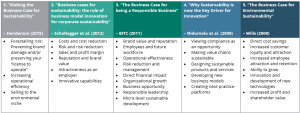When it comes to sustainability, many companies face the issue of whether investing in more sustainable business practices is really worth it. But before you set up your sustainability strategy, a business case for sustainability is crucial to ensure that you do the right things, to create buy-in and that you are able to follow up on results.
The level of corporate engagement varies depending on the company’s business strategy, and therefore the prioritization of sustainability goals may vary. According to the latest report, ‘Sustainability Top Trends 2016’ from the Ethical Corporation, the increasing importance of CSR for companies was confirmed in almost 90% of the responses from companies throughout North America, Europe and Asia. Another survey conducted by Accenture in 2013, where 1,000 CEOs in 103 countries and 27 industries were interviewed, showed that 80% of CEOs view sustainability as a means to gain competitive advantage.
In order to ensure benefits for your company, the business case for sustainability must be intelligently and strategically linked to the core business strategy. This brings conventional business models under the radar and shows that we need to distance ourselves from them to look for innovative solutions that will replace these traditional business models. According to Schaltegger et al. “without a strategic approach, the potential of the business case for sustainability is often overlooked or not understood, and the problem most commonly lies in poor accounting and management information systems” (2012).
Defining the Business Case for Sustainability
The business case for sustainability is discussed from different perspectives in the literature. Emphasis is placed on the connection between economic success and the business case, the levels of engagement, different approaches to defining the business case and the lack of strategic management for its implementation. However, before we look into the different aspects of developing and implementing the business case for sustainability, we need to take a step back and define it.
From a theoretical point of view, the business case for sustainability can generally be described as “a situation where economic success is increased while performing in environmental and social issues” (Schaltegger et al. 2012).
Another definition of the business case is through the mainstream win-win paradigm of corporate sustainability, where the business case should achieve economic, environmental and social sustainability goals simultaneously (Hahn et al. 2010). This definition is an adaptation of the definition from the Brundtland Commission, to “meet the needs of a firm’s direct and indirect stakeholders […], without compromising its ability to meet the needs of future stakeholders as well”. The win-win paradigm has encountered a certain level of critique in the literature due to the simplistic view of achieving continuous harmony between the three aspects.
What is thus more important, is how to manage, advance or innovate the links between environmental and social action and economic success. Without strategic planning and implementation, the business case for sustainability is often seen as an ad hoc measure that may coincidentally complement the existing business model and potentially bring economic benefits as a consequence.
Drivers for creating the Business Case for Sustainability
The drivers behind the development of the business case may differ from one company to another. Consequently, this could influence the level of its implementation and, ultimately, the results. It could also influence the degree of management buy-in.
In today’s market, companies are continuously faced with the challenge of attracting new customers and staying competitive. As customers become more aware of the impact of their personal choices on the environment, the demand for environmentally sound products is increasing. This confronts companies with the need to introduce change into their business models in accordance with today’s most pressing social and environmental issues. Change may be required on different levels of the company’s organization. Bearing this in mind, the drivers for developing a business case for sustainability evolve from different situations and frame conditions. These drivers may derive from regulatory requirements, non-governmental organization advocacy, product recalls, media attention, consumer demand or the recognition of a new market opportunity (Rossi 2014).
To ensure a better understanding of the business case for sustainability, one needs to be able to understand these drivers. What drives companies to take action toward developing the business case for sustainability? In the literature we analysed, these drivers are related to the initial motivation and the direct or indirect benefits the business case can provide.
Different drivers can shape the business case for sustainability and outline several categories. These drivers can be understood as the reason or motivation behind a corporate sustainability strategy that also influences the business case for sustainability. Some of these categories are often defined in a similar way, or they relate to the same area of influence the business case can have.
To provide a good overview of various drivers, we prepared the following table based on 5 articles on the topic of the Business Case for Sustainability.
As we can see from the table, different authors have defined different drivers that might be summarized as:
- risk reduction and reduction of negative financial impacts
- positive financial impacts and growth through new markets, increased sales and cost reduction
- reputation issues
- operational efficiency and effectiveness
- improved attractiveness as an employer
However, for most of the categories it is important to look into their definitions more in-depth and understand what is behind these categories and why they can be understood as drivers for the business case for sustainability and what risks and opportunities may arise from them.
For a detailed analysis of the drivers for the business case, please download our White Paper on the Business Case for Sustainability. If you would like to be informed about further interesting topics, please subscribe for our newsletter here.
This is article 1 of 2 in our Business Case for Sustainability series. Article 2 “Develop your Business Case for Sustainability and learn from others!“ provides support for you to build the business case for sustainability for your company.
Make sure not to miss our latest articles – check our homepage regularly or sign up to our newsletter and get the notice immediately!
References
Accenture (2013): “The UN Global Compact-Accenture CEO Study on Sustainability”. Available from: https://www.unglobalcompact.org/docs/news_events/8.1/UNGC_Accenture_CEO_Study_2013.pdf.
BITC (2011): “The Business Case for being a Responsible Business”. Available from: https://www.bitc.org.uk/sites/default/files/kcfinder/files/Business_case_final1.pdf.
Hahn,T., Figge, F., Pinkse, J. and Preuss, L. (2010): “Trade-offs in Corporate Sustainability: You Can’t have your Cake and Eat It”. Business Strategy and Environment, Volume 19, Issue 4, May 2010, pp. 217–229.
Henderson, R. (2015): “Making the Business Case for Environmental Sustainability”. Working paper 15-068. Harvard Business School.
Nidumolu, R., Parhalad, C. K. and Rangaswami, M.R. (2009): “Why Sustainability Is Now the Key Driver of Innovation”. Harvard Business Review, September 2009. Available from: https://hbr.org/2009/09/why-sustainability-is-now-the-key-driver-of-innovation.
Rossi, M. (2014): “The Business Case for Knowing Chemicals in Products and Supply Chains”. Available from: http://drustage.unep.org/chemicalsandwaste/sites/unep.org.chemicalsandwaste/files/publications/UNEP%20CiP%20Business%20case_En.pdf.
Schaltegger, S., Lüdeke-Freund, F. and Hansen, E. G. (2012): “Business cases for sustainability: the role of business model innovation for corporate sustainability”. International Journal of Innovation and Sustainable Development, 2012, Vol. 6, No. 2, pp. 95-119.
Wills, B. (2009): “The Business Case for Environmental Sustainability (Green) – Achieving rapid returns from practical integration of Lean & Green”. Available from: http://seedengr.com/documents/TheBusinessCaseforEnvironmentalSustainability.pdf.










Leave a Comment